
Theodor Horydczak Washington Monument 1933

“The worry is a “negative feedback loop between a weakening yuan and capital flight”.
• China Capital Flight Flashes Warning As Authorities Prick Property Bubble (AEP)
Capital outflows from China are accelerating. The hemorrhage has reached the fastest pace since the currency panic at the start of the year. The latest cycle of credit-driven expansion has already peaked after 18 months. Beijing has had to slam on the brakes, scrambling to control property speculation that the Communist authorities themselves deliberately fomented. How this episode could have happened is astonishing, given that premier Li Keqiang has warned repeatedly that excess credit is becoming dangerous and will ultimately doom China to the middle income trap. It will be clear by early to mid 2017 that the economy is rolling over and that the underlying ‘quality of growth’ has deteriorated yet further. “We think the recovery will run out of steam early next year,” said Chang Liu from Capital Economics.
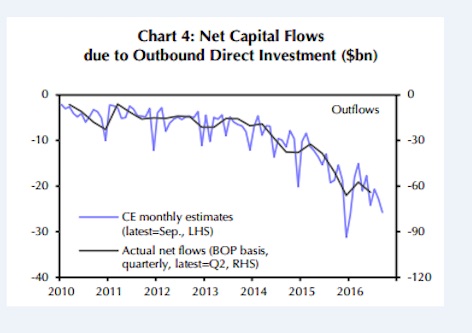
This stop-go rotation – an all-too familiar pattern – coincides with an incipient liquidity squeeze in global finance as dollar LIBOR and Eurodollar rates ratchet upwards. A rate rise by the US Federal Reserve will clinch it. Since the commodity rebound is in great part driven by demand for Chinese industry and construction – and by a touching belief that China’s economy will sail majestically through 2017 – this looming slowdown spells trouble. Stress is already visible in the capital account. Morgan Stanley estimates that net outflows reached $44bn in September. Capital Economics thinks the figure was closer to $55bn, led by a surge in purchases of off-shore securities through the Shanghai-Hong Kong Stock Connect Scheme.
This does not yet match the capital flight seen late last year when a mismanaged shift in exchange rate policy set off outflows averaging $70bn a month, and triggered the global equity rout of January and February. But it is nearing a neuralgic threshold for currency traders. Beijing is clearly alarmed. Nikkei’s Yusho Cho reports that the authorities have ordered banks in Shanghai and Guangzhou to restrict access to foreign currency, and have imposed a “gag order” to keep it quiet. Institutions must now justify why they need foreign exchange. The worry is a “negative feedback loop between a weakening yuan and capital flight”. The central bank (PBOC) spent roughly $50bn defending the yuan last month, but this has not stopped the exchange rate sliding to 6.77 against the dollar – the weakest in six years.
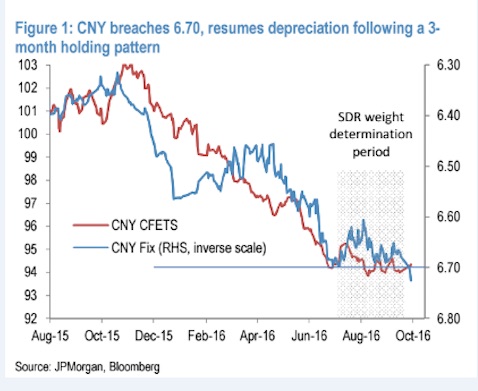
The PBOC has burned through $800bn of foreign reserves since mid-2014, when they peaked at $4 trillion. It still has ample fire-power but bond sales automatically tighten China’s internal monetary policy since it is hard to sterilize the effect, and tightening may the last thing they want if the economy is slowing hard next year. “Our view is that the RMB (yuan) will depreciate 20pc against the US dollar to 8.1 by the end of 2018 as deflation of the property bubble leads to more capital outflows,” Zhiwei Zhang from Deutsche Bank. “This is deflationary for global trade.”

Velocity of money is the no. 1 Deflation indicator.
• Unacceptable Cures for the Days Ahead (Dent)
Then Dr. Lacy Hunt took the stage… As I was telling Boom & Bust subscribers in their 5 Day Forecast email on Monday, he’s the only economist (outside of Steve Keen from Australia, who’s currently in hibernation in London) that I recommend you to follow. He’s classically trained and deeply knowledgeable, and goes beyond the theoretical nature of his chosen field. He understands how debt and financial bubbles build and deleverage, a rarity among economists today. And he has possibly the best explanation of money velocity. Basically, it’s a sign of how productive investment in the economy is. Productive investment creates more profits, jobs and expansion, and hence, greater M2 velocity. Speculation, stock buybacks or empty buildings do not. His money velocity chart was my favorite of the conference.
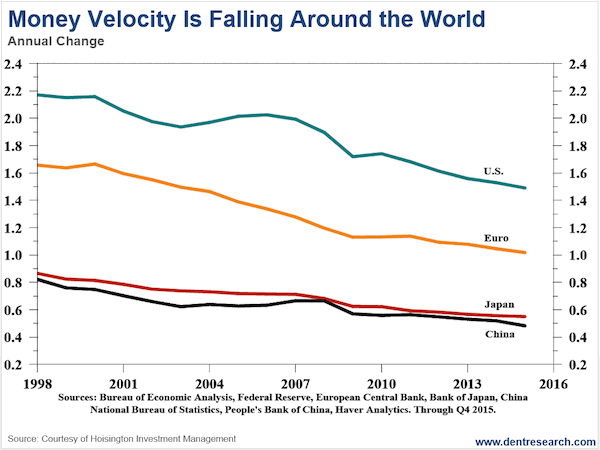
With this single chart, Lacy shows the level and falling trends for money velocity across the U.S., Europe, Japan and China. And as you can see, the most unproductive investment is in China! See, solid proof from perhaps the most competent economist in America! Building stuff for no one isn’t productive for the economy. This is the most concrete proof yet of something that should be obvious. Despite 6-10% growth rates, China’s money velocity is even lower than Japan’s most dismal “coma economy” that is surviving solely on endless QE as they age and see exponential growth in debt levels… Do you get this? China is worse than Japan when you reflect the truth of money velocity. You can also see why we are the best house in a bad neighborhood. Our money velocity, despite continually slowing since 2000, is 50% stronger than the euro and three times that of Japan and China.

The end of Abenomics nears..
• Japan Consumer Prices Keep Falling, Household Spending Slips (BBG)
Japan’s consumer prices fell for a seventh straight month and household spending slumped again in September, underscoring the challenges Prime Minister Shinzo Abe and Bank of Japan Governor Haruhiko Kuroda face in trying to revive the world’s third-largest economy. The downbeat inflation and spending data came despite an increasingly tight labor market. The unemployment rate slipped to 3% in September, equal to the lowest since 1995. The low jobless figure hasn’t yet resulted in significant wage gains, a key element of efforts to reflate Japan’s economy.
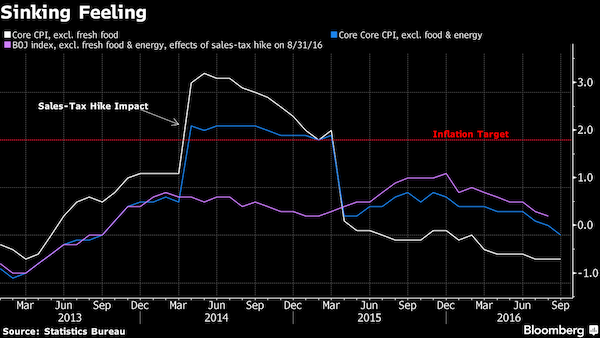

…and that is also the end of Kuroda.
• Bank of Japan Loses Bark And Bite Under Humbled Kuroda (R.)
As his term winds down, Bank of Japan Governor Haruhiko Kuroda has retreated from both the radical policies and rhetoric of his early tenure, suggesting there will be no further monetary easing except in response to a big external shock. In a clear departure from his initial “shock and awe” tactics to jolt the nation from its deflationary mindset, he has even taken to flagging what little change lies ahead, trying predictability where surprise has failed. This new approach will be on show next week, when the BOJ is set to keep policy unchanged despite an expected downgrade in forecasts that could show Kuroda won’t hit his perpetually postponed 2% inflation target before his five-year term ends in April 2018. “The days of trying to radically heighten inflation expectations with shock action are over,” said a source familiar with the BOJ’s thinking. “No more regime change.”
Kuroda told parliament last week that while the BOJ might again stretch the timing for its inflation target, he saw no need to ease at the Oct. 31-Nov. 1 policy meeting. “There may be some modification to our forecast that inflation will hit our 2% target during fiscal 2017,” he said, the first time he has offered hints on upcoming projections. In the past, the market has learned to expect the unexpected. In 2013, when the BOJ deployed its massive asset-buying program, dubbed “quantitative and qualitative easing” (QQE), his shock therapy boosted stocks and weakened the yen. Further surprises came with an expansion of QQE in October 2014, and then the switch to negative rates early in 2016, which he had denied was an option just days before. But the law of diminishing returns bought him less bang for each buck.

Nice research, the graph shows hoe German data hide the sinking of Europe. Quite poorly reported, though.
• The Gap Between Poor And Rich Regions In Europe Is Widening (Economist)
The beautiful but rubbish-strewn streets of Catania, Sicily’s second-biggest city, are a world away from swanky Trento, in the country’s richer north. About a quarter of Sicilians are “severely materially deprived”—meaning that they cannot afford things like a car, or to heat their home sufficiently—compared with just 5% in Trento. Italy is not unique. In many places, the divide within countries appears to be getting worse. According to an analysis by The Economist, the gap between richer and poorer regions of euro-zone countries has increased since the financial crisis. Our measure of regional inequality looks at the average income per head of a country’s poorest region, expressed as a%age of the income of that country’s richest part. The weighted average for 12 countries shows that regional inequality was declining in the years leading up to the financial crisis of 2007-08, but has increased since then (see chart).
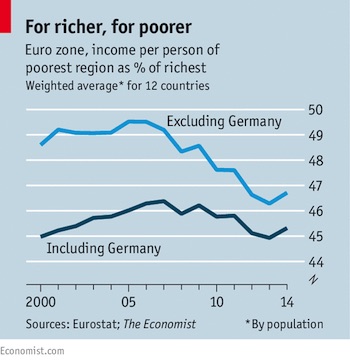
The poorest area in Slovakia, the euro zone’s most geographically unequal economy, now has an income per person of just 28% of the richest, a slight fall from before the crisis. In Calabria, Italy’s poorest region, income per person as a share of the country’s best-off part, the province of Bolzano, was 45% in 2007 but is only 40% now. Elsewhere poor regions of the euro zone have seen income falling in both relative and absolute terms. An exception is Germany: in its once-communist east, excluding Berlin, GDP per person reached 67% of that in former West Germany last year. (Most of the catch-up took place in the early 1990s, but continues more slowly.) Deindustrialisation is partly to blame. Most of the euro zone’s 19 members have fewer manufacturing jobs than in 2008.
Manufacturing employment is high in many of Europe’s poorer countries, but they have lost international competitiveness in part because of an overvalued euro. Tight public spending also plays a role. Since 2008 the number of civil servants in the euro zone has fallen by about 6%. This has often hurt needy regions most. Cuts in welfare benefits also hit harder. A paper by Luca Agnello, Giorgio Fazio and Ricardo Sousa, three economists, found that austerity led to higher regional inequality in 13 European countries between 1980 and 2008. This suggests that the problem will continue: public funds will be tight for years to come, while weak public spending on education and infrastructure will crimp future growth. Even if the euro zone starts to grow strongly again, the geographical scars will be plain to see.

China will be calling out loud for a strong leader as its economy grinds to a halt.
• Xi Jinping Becomes ‘Core’ Leader Of China (R.)
China’s Communist party has given the president, Xi Jinping, the title of “core” leader, putting him on par with previous strongmen Mao Zedong and Deng Xiaoping, but signalled his power would not be absolute. A lengthy communique released after a four-day meeting of senior officials in Beijing emphasised the importance of collective leadership. The system “must always be followed and should not be violated by any organisation or individual under any circumstance or for any reason”, the party said. But all members should “closely unite around the central committee with comrade Xi Jinping as the core”, said the document, released through state media. The core leader title marks a significant strengthening of Xi’s position before a key party congress next year, at which a new standing committee, the pinnacle of power in China, will be constituted.
Since assuming office almost four years ago, Xi has rapidly consolidated power, including heading a group leading economic change and appointing himself commander-in-chief of the military, though as head of the central military commission he already controlled the armed forces. While head of the party, the military and the state, Xi had not previously been given the title “core”. Deng coined the phrase “core leader”, and said he, Mao Zedong and Jiang Zemin were core leaders, meaning they had almost absolute authority and should not be questioned. Xi’s immediate predecessor, Hu Jintao, was never called the “core”. The plenum meeting paves the way for a congress, held every five years, in autumn 2017, at which Xi will further consolidate his power and which could indicate who may replace him at the 2022 congress.

Nomi’s very mild and polite.
• Waking Up in Hillary Clinton’s America (Nomi Prins)
To date, $10 trillion worth of assets sits on the books of the Big Six banks. Since 2008, these same banks have copped to more than $150 billion in fines for pre-crisis behavior that ranged on the spectrum of criminality from manipulating multiple public markets to outright fraud. Hillary Clinton has arguably taken money that would not have been so available if it weren’t for the ill-gotten gains those banks secured. In her usual measured way, albeit with some light admonishments, she has told them what they want to hear: that if they behave – something that in her dictionary of definitions involves little in the way of personalized pain or punishment – so will she.
So let’s recap Hillary’s America, past, present, and future. It’s a land lacking in meaningful structural reform of the financial system, a place where the big banks have been, and will continue to be, coddled by the government. No CEO will be jailed, no matter how large the fines his bank is saddled with or how widespread the crimes it committed. Instead, he’s likely to be invited to the inaugural ball in January. Because its practices have not been adequately controlled or curtailed, the inherent risk that Wall Street poses for Main Street will only grow as bankers continue to use our money to make their bets. (The 2010 Dodd-Frank Act was supposed to help on this score, but has yet to make the big banks any smaller.)
And here’s an obvious corollary to all this: the next bank-instigated economic catastrophe will not be dealt with until it has once again crushed the financial stability of millions of Americans. The banks have voted with their dollars on all of this in multiple ways. Hillary won’t do anything to upset that applecart. We should have no illusions about what her presidency would mean from a Wall Street vs. Main Street perspective. Certainly, JPMorgan Chase CEO Jamie Dimon doesn’t. He effectively endorsed Hillary before a crowd of financial industry players, saying, “I hope the next president, she reaches across the aisle.” For Wall Street, of course, that aisle is essentially illusory, since its players operate so easily and effectively on both sides of it. In Hillary’s America, Wall Street will still own Main Street.

“Reality TV Land will immediately install itself in the Oval Office if he wins. Then, anything goes.”
• Donald Trump Has Won, Even If He Loses The US Election (Malmgren)
Donald Trump has already won the US presidential election and Hillary Clinton has already lost it, even if she emerges with the title of commander-in-chief. It is already apparent that Trump will not skulk off the global stage. Nor will he have to. Consider what happens if he loses the presidential race. He will most likely launch a reality TV show that will undoubtedly attract a record number of viewers. From this ridiculously unconstrained and lucrative perch, he’ll relentlessly attack President Clinton, the Republican Party and the Democratic Party alike. In retrospect, it will be clear that his entire campaign was a trailer for the blockbuster show that follows. In this way he will continue to influence, if not dominate, public opinion.
[..] he won’t go away. Neither will the forces that swept him to the top of politics: the anger, the loss, the sense of unfairness, the inability of the traditional parties to deliver a better outcome for most Americans. Meanwhile, the expectation that a Clinton presidency could conquer these forces is also likely to be proved false. The Oval Office is a highly constrained place that limits the influence of its occupant especially in the face of broader political disarray. She can try and set the tone but the rest of the political establishment looks too dysfunctional, and largely unwilling, to be able to help her. Her presidency seems set to open with high expectations and low approval ratings. Trump, however, could move to the next phase of his career with low expectations and high TV ratings.
Both have faced threats of prosecution throughout this long and increasingly ugly campaign. But, does Trump care if the courts or the government put his tax returns or the sexual allegations against him to the test? He won’t. Will he care if his emails are leaked? No. The real “public prosecutor” for Trump is the Fourth Estate – the media. It will prosecute him just as relentlessly if he becomes commander-in-chief but probably with the same limited impact. Will it matter to Clinton if her emails, from the past or future, are displayed to the public? Will it matter if the Clinton Foundation faces further allegations of “crooked” behaviour? But, we live in the internet age. The real “public prosecutor” for Clinton is and will remain Julian Assange and Wikileaks. His sights will continue to be firmly set on her. He does not care about Trump and Trump doesn’t care about him. Once again, Trump wins.
Trump’s only real threat of looking like the loser comes if the polls are wrong and he ends up winning. Many wonder whether he really wants the job. After all, the Oval Office is the political equivalent of a straightjacket. In theory, Trump won’t be able to shoot words from the hip so freely once he is sitting in the big shiny chair with his finger on the literal and metaphorical button. But, Reality TV Land will immediately install itself in the Oval Office if he wins. Then, anything goes. In the meantime, he will “win” in his effort to redefine America’s political landscape. As president, it won’t matter to him if the House and Senate block him. He is not concerned with process. His job is to break down the traditional political establishment.

“Any report advocating war that comes from any alleged think tank ought to be accompanied by a list of the think tank’s sponsors and donors..”
• Why Is the Foreign Policy Establishment Spoiling for More War? (Kucinich)
The American people are fed up with war, but a concerted effort is being made through fearmongering, propaganda, and lies to prepare our country for a dangerous confrontation, with Russia in Syria. The demonization of Russia is a calculated plan to resurrect a raison d’être for stone-cold warriors trying to escape from the dustbin of history by evoking the specter of Russian world domination. It’s infectious. Earlier this year the BBC broadcast a fictional show that contemplated WWIII, beginning with a Russian invasion of Latvia (where 26% of the population is ethnic Russian and 34% of Latvians speak Russian at home). The imaginary WWIII scenario conjures Russia’s targeting London for a nuclear strike.
No wonder that by the summer of 2016 a poll showed two-thirds of UK citizens approved the new British PM’s launching a nuclear strike in retaliation. So much for learning the lessons detailed in the Chilcot report. As this year’s presidential election comes to a conclusion, the Washington ideologues are regurgitating the same bipartisan consensus that has kept America at war since 9/11 and made the world a decidedly more dangerous place. The DC think tanks provide cover for the political establishment, a political safety net, with a fictive analytical framework providing a moral rationale for intervention, capitol casuistry. I’m fed up with the DC policy elite who cash in on war while presenting themselves as experts, at the cost of other people’s lives, our national fortune, and the sacred honor of our country.
Any report advocating war that comes from any alleged think tank ought to be accompanied by a list of the think tank’s sponsors and donors and a statement of the lobbying connections of the report’s authors. It is our patriotic duty to expose why the DC foreign-policy establishment and its sponsors have not learned from their failures and instead are repeating them, with the acquiescence of the political class and sleepwalkers with press passes.

“As I said it has long been our analysis that Hillary Clinton will win the election because she has all the establishments on her side..”
• Assange First Interview Since Being Censored (JJ)
“Wikileaks is one of the fighting dogs that has a lot of energy and runs around fighting all the time. It is built to fight it loves nothing more than to fight. And so when my internet was cut off we had long ago made strategic contingency plans for exactly this situation. So despite bombs raining down on us from statements by high US officials, media and so on this is exactly the sort of situation we enjoy so there was not even one day pause. We just continued on publishing the next day even though I was cut off from my team.” “As I said it has long been our analysis that Hillary Clinton will win the election because she has all the establishments on her side and we can see it in terms of polling.
If someone like Donald Trump – who has a great many problems I’m sure all of you are aware of it – but if he managed to get up to the 48% or 50% level in the polling which he has just on two occasions across the different polls united, immediately those big media networks and the funders get together and smash him back down. So I don’t think there’s any chance of Donald Trump winning the election. That would probably be bad inside the United States. It would probably be good outside the United States. Even with the amazing material we have published and will continue to publish because even though we publish it and there’s a lot of people reading it on the internet directly, most of the media originations in the United States are very strongly aligned with Hillary Clinton.
Two reasons really, a lot of them are owned by big businesses which are owned by banks which like Hillary Clinton. And the other is a class reason. Most journalists and media workers are very middle class and Donald Trump represents in their minds, white trash. So to do anything that looks to be like it might be supporting Donald Trump looks like you’re supporting white trash. And to those rivals that they have within their class they are white trash. So it lowers their social status and that’s a very dangerous thing to do in an institution, to have your social status lowered, because someone might get your job or the job that you want to have within the institution. So there is a lot of conformity and fear around criticizing Hillary Clinton in any way at all and it reduces the impact of even very significant material that is being released.”

Can Iceland give the world back its lost democracy?
On the eve of the Icelandic Elections… WITHER DEMOCRACY, by Professor Lawrence Lessig, speaking from the University of Iceland. Lessig explains how democracy has failed the US and other citizens of the world, and how Iceland is on the brink of implementing an entirely new and improved system, based on a PEOPLE’S CONSTITUTION. Yes, it’s a world first, but then Iceland was the first country ever to form a parliament. Lester Lawrence “Larry” Lessig III is an American academic, attorney, and political activist. He was the co-founder, with our beloved Aaron Swartz, of Creative Commons. He is the Roy L. Furman Professor of Law at Harvard Law School; and the former director of the Edmond J. Safra Center for Ethics at Harvard University.

Our moral bankruptcy in all its splendor.
• Calais Children Abandoned At Former ‘Jungle’ Camp Site (EuO)
Scores of children have been left out in the cold, after French authorities flattened the make-shift migrants camp in Calais, in northern France, earlier this week. Journalists report that around a hundred children were sleeping rough on the remains of the camp, among burned-out shacks and riot police. The Guardian spoke to children who had been lured off the camp site, with promises of being transferred to reception centres where their asylum claims would be assessed. Instead, riot police cornered the group while bulldozers razed the camp. Media and NGO reports of the children’s treatment triggered protests of British home secretary Amber Rudd, who told her French counterpart, Bernard Cazeneuve, on Thursday, that children remaining in Calais had to be properly protected.
Cazeneuve later issued a statement saying he was surprised by Rudd’s declaration. He said France had given shelter to 1,451 minors since 17 October recalling that Britain had a legal duty to take those children that have a link to the UK, for instance through family. 274 children have been allowed to travel to the UK in the last two weeks. The decision to clear the camp came from French president Francois Hollande, calling it a ”humanitarian emergency” during a visit in September. French authorities started evacuating the camp, also known as the Jungle, on Monday (24 October) and said they had relocated almost all of the 6,000 people estimated to have been living there to other parts of France. [..] British baroness Shas Sheehan, who has been working as a volunteer teacher in the camp prior to its dismantlement, accused France and the UK of human rights violations, pointing to official assurances by both sides that the site wouldn’t be demolished before all the children were safeguarded.









Home › Forums › Debt Rattle October 28 2016